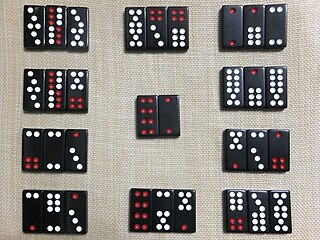
Chinese dominoes are used in several tile-based games, namely, tien gow, pai gow, tiu u and kap tai shap. In Cantonese they are called gwāt pái (骨牌), which literally means "bone tiles"; it is also the name of a northern Chinese game, where the rules are quite different from the southern Chinese version of tien gow.

Dominoes is a family of tile-based games played with gaming pieces. Each domino is a rectangular tile, usually with a line dividing its face into two square ends. Each end is marked with a number of spots or is blank. The backs of the tiles in a set are indistinguishable, either blank or having some common design. The gaming pieces make up a domino set, sometimes called a deck or pack. The traditional European domino set consists of 28 tiles, also known as pieces, bones, rocks, stones, men, cards or just dominoes, featuring all combinations of spot counts between zero and six. A domino set is a generic gaming device, similar to playing cards or dice, in that a variety of games can be played with a set. Another form of entertainment using domino pieces is the practice of domino toppling.
Zebra is one of several species of the horse genus Equus whose members have distinctive stripes.
A cookie is a baked or cooked good that is small, flat and sweet
Rocky is a 1976 film starring Sylvester Stallone.
A superstar is a widely acclaimed celebrity.
Bingo or B-I-N-G-O may refer to:
End, END, Ending, or variation, may refer to:

No One Can Stop Mr. Domino! is a puzzle video game developed by Artdink and released for the PlayStation in 1998. The user controls one of five anthropomorphic dominoes, placing other dominoes in rows that will successfully topple while avoiding obstacles and working under a time limit.

Muggins, sometimes also called All Fives, is a domino game played with any of the commonly available sets. Although suitable for up to four players, Muggins is described by John McLeod as "a good, quick two player game".

Mexican Train is a game played with dominoes. The object of the game is for a player to play all the tiles from his or her hand onto one or more chains, or trains, emanating from a central hub or "station". The game's most popular name comes from a special optional train that belongs to all players. However, the game can be played without the Mexican train; such variants are generally called "private trains" or "domino trains". It is related to the game Chicken Foot.
A tree is a perennial woody plant.
Charade or charades may refer to:

Domino toppling is the activity of standing up dominoes in sequence known as a domino run and then triggering the first one in line to create a chain reaction also called the domino effect. A competition between two or more players to be first to have all one's dominoes fall is sometimes called a domino rally. If domino toppling is demonstrated to an audience it is called a domino show.
Little Caesar may refer to:
Howard William Casey is a British rhythm and blues and rock saxophonist. He came to prominence in the early 1960s as a member of Derry and the Seniors, the first rock and roll band from Liverpool to play clubs in Germany, and later as leader of the renamed Howie Casey and the Seniors, the first Liverpool group to record an LP. He was a sought after session musician, particularly in horn sections in the 1970s, recording and/or touring with groups including Paul McCartney and Wings, T. Rex, The Who and ABC.
This page is based on this
Wikipedia article Text is available under the
CC BY-SA 4.0 license; additional terms may apply.
Images, videos and audio are available under their respective licenses.





